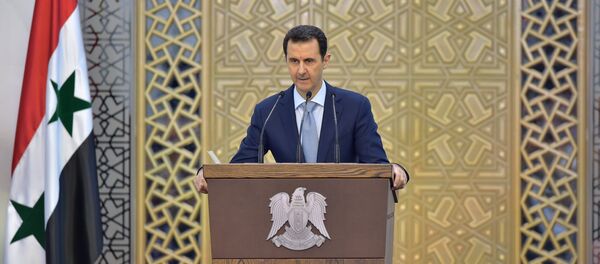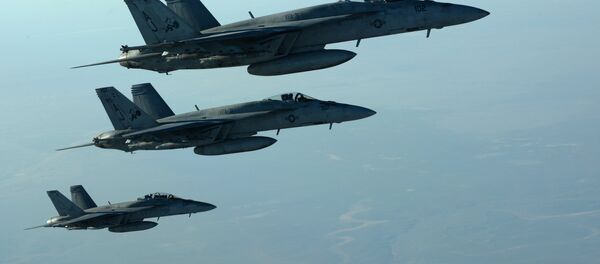The recent conference held by the Syrian "moderate rebels" in Saudi Arabia has highlighted that the so-called opposition includes a number of al-Qaeda affiliates, for instance, Ahrar al-Sham and Jaysh al-Islam, designated by the US State Department as terrorist organizations in 2012, Bangkok-based geopolitical analyst Tony Cartalucci narrates.
"Ahrar al-Sham and Jaysh al-Islam are part of the US and Saudi Arabia's wider shell game in which they train, fund, arm, and back al-Qaeda terrorists under a myriad of varying and constantly shifting aliases and front groups. The result has been al-Qaeda and ISIS' [Daesh's] otherwise inexplicable rise upon and domination of the battlefield, not to mention a large and steady stream of US-provided weaponry and vehicles 'falling into' al-Qaeda's hands," Tony Cartalucci points out in his recent article for New Eastern Outlook.
According to Cartalucci, Syria's branch of the Muslim Brotherhood was reorganized and sent to Afghanistan by the US and Saudi Arabia to fight a proxy war against the USSR in the 1980s.
"Since then, the group has serendipitously found itself engaged on every battlefield and in every region the US has sought to influence, whether it was in the Balkans and Chechnya, across the Middle East and North Africa (MENA), or even as far flung as Southeast Asia," Cartalucci underscores.
The geopolitical analyst stresses that during the US occupation of Iraq al-Qaeda played a pivotal role in splitting the Iraqi resistance against the American invasion.
The geopolitical analyst reveals that in 2007 Washington and Riyadh were planning to use these terrorists "again" in order to overthrow the governments of Syria and Iran. He quotes Pulitzer Prize-winner Seymour Hersh who described in his 2007 report "The Redirection" the details of the conspiracy.
Remarkably, when the Syrian uprising erupted in 2011, it was al-Qaeda, the Muslim Brotherhood and the Salafists who instigated the bloodbath in the country.
"When the first shots were fired in the Syrian conflict, those who have been paying close attention to al-Qaeda knew that from the very beginning, Hersh's prophetic report was finally being fulfilled," Cartalucci stresses, adding that despite all the speculations of the Western press over who was behind the Syrian "opposition," it has eventually turned out that it was al-Qaeda itself.
"Al-Nusra [Front, al-Qaeda's affiliate] and ISIS' [Daesh's] rise to prominence was not the result of US foreign policy backfiring in Syria, it was the result of US foreign policy working precisely as planned," Cartalucci believes.
Cartalucci explains that in accordance with the "plan," Daesh has to "colonize" parts of Syria and Iraq disseminating Islamic fundamentalism in the form of radical Wahhabism.
Citing the Defense Intelligence Agency's (DIA) 2012 document, the analyst draws attention to the fact that "establishing a declared or undeclared Salafist [Islamists'] principality" in Syria was "exactly what the supporting powers to the opposition want[ed]." According to the DIA report, "supporting powers" are "the West, Gulf countries, and Turkey."
In this light the US' inconsistent foreign policy in the Middle East as well as a year-long ineffective military operation against Daesh come as no surprise to Cartalucci.
"And for those wondering why Saudi Arabia is inviting obvious accomplices of al-Qaeda to its capital, Riyadh, for a confab about Syria's future, it is precisely because Saudi Arabia played a leading role in creating al-Qaeda as a means of influencing Syria's future to begin with — a conspiracy it is still very much, clearly involved in and a conspiracy the United States doesn't seem troubled leading along," Cartalucci concludes.




